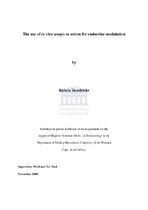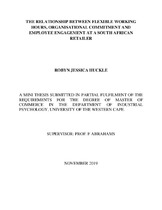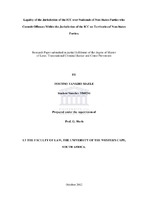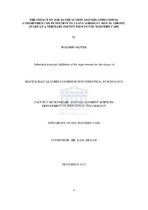Organisational commitment after a transformation process at a provincial government department
Abstract
Organisations are by nature, dynamic entities that continuously undergo transformation in response to both internal and external pressures, which are imposed on them (Robbins, Odendaal & Roodt, 2003). Government departments are by no means immune to these changes, which pose challenges that affect their service delivery. During periods of fundamental transformation, individuals typically experience changes in their levels of organisational commitment, which impacts on effective and efficient service delivery. Organisational commitment as an area of research is one of the factors that could lead to greater morale, strong organisational climate, motivation and productivity in many organisations facing transformation (Salami, 2008). The aim of this study was to investigate the level of organisational commitment after a transformation process at a Provincial Government Department. Recent organisational transformations (both in the private and public sector) have included the redrawing of divisional boundaries, flattening of hierarchic levels, spreading of spans of control, revising compensation, streamlining processes and reforming governance (Ndlovu & Brijball Parusumar, 2005). The results of the research indicate that employees are moderately committed to the organisation. Statistically significant relationships were found between the dimensions of organisational commitment, except for affective commitment and total commitment which were not significant. Furthermore, results indicate that statistically significant differences exist based on the biographical characteristics (namely, gender, race, tenure, marital status, age and job level) but these characteristics do not significantly explain the variance in organisational commitment for this organisation. A limitation of the research is that the sampling composition and research design preclude the results of this study being generalised to other organisations and it is recommended that a stratified random sampling design be utilised for future research.
Collections
Related items
Showing items related by title, author, creator and subject.
-
The relationship between flexible working hours, organisational commitment and employee engagement at a South African retailer
Huckle, Robyn Jessica (2019-11)In the twenty first century, the traditional roles in a nuclear family have changed. In the majority of modern families, both partners have careers and full-time jobs. Burnett, Gatrell, Cooper and Sparrow (2010) explain ... -
Legality of the jurisdiction of the ICC over nationals of non-states parties who commit offences within the jurisdiction of the ICC on territories of non-states parties
Maele, Fostino Yankho (University of the Western Cape, 2012)The coming into force of the Rome Statute on the 1st July 2002 signified the birth of the International Criminal Court (ICC). The ICC came into existence as a permanent criminal court for the prosecution of Genocide, Crimes ... -
The impact of job satisfaction and organisational commitment on intention to leave amongst non-academic staff at a tertiary institution in the Western Cape
Oliver, Rozario (University of the Western Cape, 2011)A critical feature of globalisation is to attract and retain intellectual capital to ensure that a cadre of highly skilled, independent, internationally marketable and mobile employees is achieved (Sutherland & Jordaan, ...




